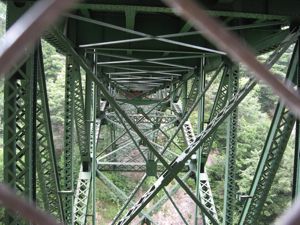 Undergraduate education is very important
to me, and I have dedicated a great deal of time to
developing novel approaches to traditional subjects such
as introductory biology, particularly in courses for to
students from outside of the natural sciences.
Undergraduate education is very important
to me, and I have dedicated a great deal of time to
developing novel approaches to traditional subjects such
as introductory biology, particularly in courses for to
students from outside of the natural sciences. Achieving a better understanding of the process of science and how scientific knowledge meshes with other forms of understanding our world, are key. Both improve each person's ability to use information and improve the future of our society and the health of our environment.
I strongly believe that scientism - the philosophical stand that holds that the scientific method is the best way to construct knowledge - is not only false but damaging to both scientists and to non-scientists. It gives scientists a false sense of superiority and can "turn off" non-scientists. The false presumption that "science" is the only way to know and evaluate the world around us leads to abuses such as the dismissal of all non-quantitative data in educational assessments (for instance, the No Child Left Behind legislation specifically defines assessment of learning as quantitative data; Beghetto 2003).
By exploring the literature and philosophy of learning, I seek to better understand how humans make sense of our world; how we "make meaning" by integrating what our senses tell us with what we acquire from others. This "constructionist" point of view may appear contrary to the "positivist" approach of the classic scientific paradigm, but it helps me - and perhaps you - to bear in mid that what each of us knows is what is in our individual minds. The ability to critically consider your own knowledge - to reflect upon your understanding and recognize what is missing and then search for new information - is what turns you into a life-long learner.
I have taught a wide range of introductory and advanced classes. Because detailed factual content is readily available to students on line, I focus on helping students understand the scientific process and how scientists learn about the biological processes that make life on Earth possible. While I acknowledge that learning basic factual content is necessary, I believe that most students – majors and non-majors – are poorly prepared to recognize valid scientific questions and to evaluate information presented in the media. Moreover, there is good experimental evidence that remembering detailed factual content is actually easier for students who have first been exposed to the bigger picture ideas of the processes involved (Mishra & Brewer 2003).
My goal is to educate young adults to use critical thinking skills in order to evaluate their own knowledge, and to make informed, ethical decisions about their lives and the world around them. I employ in-class activities and on-line quizzes to develop each student's ability to understand science and critically assess the validity of both data and conclusions of research and media presentations. In courses with self-design research, exercises in class provide guide students towards identifying interesting questions, developing testable hypotheses, and designing experimental protocols. Below are links to pages describing some aspects of my own explorations of making learning both more relevant and more effective for general education students.